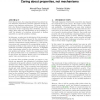Free Online Productivity Tools
i2Speak
i2Symbol
i2OCR
iTex2Img
iWeb2Print
iWeb2Shot
i2Type
iPdf2Split
iPdf2Merge
i2Bopomofo
i2Arabic
i2Style
i2Image
i2PDF
iLatex2Rtf
Sci2ools
119
click to vote
NSPW
2004
ACM
2004
ACM
Property-based attestation for computing platforms: caring about properties, not mechanisms
Over the past years, the computing industry has started various initiatives announced to increase computer security by means of new hardware architectures. The most notable effort is the Trusted Computing Group (TCG) and the NextGeneration Secure Computing Base (NGSCB). This technology offers useful new functionalities as the possibility to verify the integrity of a platform (attestation) or binding quantities on a specific platform (sealing). In this paper, we point out the deficiencies of the attestation and sealing functionalities proposed by the existing specification of the TCG: we show that these mechanisms can be misused to discriminate certain platforms, i.e., their operating systems and consequently the corresponding vendors. A particular problem in this context is that of managing the multitude of possible configurations. Moreover, we highlight other shortcomings related to the attestation, namely system updates and backup. Clearly, the consequences caused by these prob...
| Added | 30 Jun 2010 |
| Updated | 30 Jun 2010 |
| Type | Conference |
| Year | 2004 |
| Where | NSPW |
| Authors | Ahmad-Reza Sadeghi, Christian Stüble |
Comments (0)

